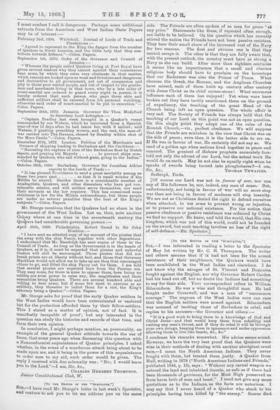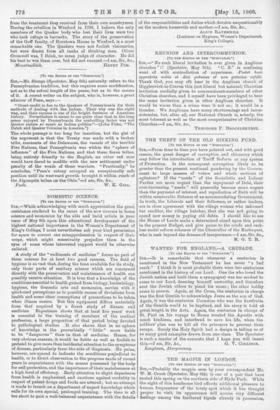[TO TRH EDITOR Or T " SP Rauron."] Sin, — I was
interested in reading a letter to the Spectator of May let written by Mr. C. H. Thompson. The writer and others assume that if it had not been for the armed assistance of their neighbours, the Quakers would have been annihilated in the West Indies and elsewhere. I do not know why the savages of St. Vincent and Dominica fought against the English, nor why Governor Robert Carden had his bead cut off, but no doubt the Indians had something to say for their side. Your correspondent refers to William Edtuundson. He was a wise and thoughtful man. He bad fought under Cromwell, and was a man of "uncommon courage." The negroes of the West Lidice were one race that the English settlers wore armed against. Edmunds= was accused of inciting those of Barbadoes to rebel, and replies to his accusers—the Governor and others :- "It is a good work to bring them to a knowledge of God and Christ Jesus—and that would keep them from rebelling and cutting any man's throat, and if they do rebel it will be through your own doings, keeping them in ignorance and under oppression allowing them to live like beasts, &c., &c."
I condense his remarks somewhat. His advice seems sound. However, we have the very best proof that the Quakers were wise in their methods of dealing with another aboriginal cruel race,—I mean the North American Indians. They never fought with them, but treated them justly. A Quaker from Hull, writing in 1678 ("North American Indians and Friends," published 1841, p. 15), says : " Without any carnal weapon we entered the land and inhabited therein, as safe as if there had
been thousands of garrisons, for the Most High preserved us from harm both of man and beast." I need not give any more quotations as to the Indians, as the facts are notorious. I may say that I never heard of a Quaker who stuck to his principles having been killed by "the enemy." Scores died from the treatment they received from their own countrymen. During the rebellion in Wexford in 1798, I believe the only members of the Quaker body who lost their lives were two who took refuge in barracks. The story of the preservation of the Goff family, of Horetown House in Wexford, is a most remarkable. one. The Quakers were not foolish visionaries, but were drawn from all ranks of thinking men. Oliver Cromwell was, I think, no mean judge of character. He did his best to win them over, but did not succeed.—I am, Sir, &c.,











































 Previous page
Previous page